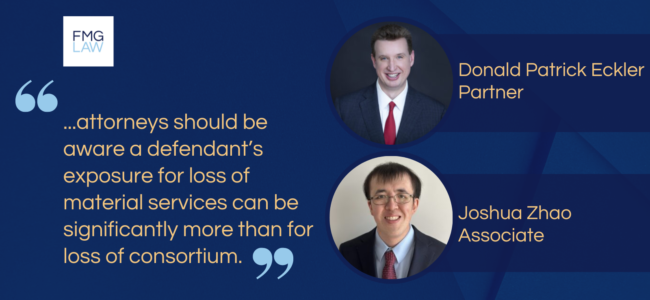BlogLine
Illinois Supreme Court affirms expansion of damages recoverable under the Wrongful Death Act
9/30/24

By: Donald Patrick Eckler and Joshua W. Zhao
In Passafiume v. Jurak, 2024 IL 129761, the Illinois Supreme Court held that a plaintiff’s remarrying does not limit the plaintiff’s recovery for loss of financial support and material services in a wrongful death lawsuit based on the plaintiff’s spouse’s death for the period prior to the plaintiff being remarried. More broadly, the court held that in a claim under Illinois’ Wrongful Death Act, the pecuniary loss can be separated from the intangible consortium damages, such as loss of society, guidance, companionship, felicity, and sexual relations.
Paul Passafiume alleged in a wrongful death and survival lawsuit against Dr. Daniel Jurak, D.O., among others, that Dr. Jurak was negligent in his treatment of Passafiume’s wife for a blood clot, which resulted in her death. Passafiume retained an economist who testified as to Passafiume’s loss of material services. Prior to trial, the defendants filed a motion in limine seeking to limit consideration of Passafiume’s loss of material services to the period prior to Passafiume’s remarriage.
Jurak argued that loss of material services is part of a loss of consortium claim, which ends upon remarriage. In contrast, Passafiume argued that loss of material services is separate from a loss of consortium claim and extends beyond remarriage.
The circuit court denied Jurak’s motion in limine and held that a loss of material services claim extends beyond remarriage. Judgment was found in Passafiume’s favor for a total of $1,697,531.48 of which $1,434,025 was for loss of material services and loss of earnings. Passafiume’s expert calculated the average wage for the services provided by the deceased as $14.99/hr., at two to three hours per day, for the remainder of her life expectancy.
Jurak filed a post-trial motion for a new trial, arguing that their motion in limine was erroneously denied. The trial court denied the post-trial motion, and Jurak appealed, arguing that the denial of the motion in limine was a reversible error. The appellate court affirmed the trial court, and Jurak appealed to the Illinois Supreme Court.
On appeal, the Illinois Supreme Court affirmed, holding that damages for loss of material services are separate from loss of consortium under the Wrongful Death Act. As a result, the damages are recoverable for a plaintiff’s spouse’s death. They are not limited if the plaintiff remarries, unlike damages for loss of consortium, which are limited upon remarriage. The Court reasoned that limiting the plaintiff’s damages for loss of material services to a loss of consortium claim would limit the plaintiff’s recovery if the plaintiff were to remarry. The Court held that such a limitation would create disparate outcomes as children and parents of the deceased could recover for loss of material services without limitation while the deceased’s spouse could not. The Court concluded that damages for loss of material services could not be contained within a loss of consortium claim and could not have the same limitations.
The Illinois Trial Lawyers Association filed an amicus brief requesting that the Court remove the limitation on loss of consortium damages altogether, but since the issue was not raised by the parties in this case, the Court declined to consider the issue.
Since the loss of material services is more expansive than the loss of consortium, attorneys should be aware a defendant’s exposure for loss of material services can be significantly more than for loss of consortium. Attorneys should ensure that their clients are aware of the liability that they potentially face in a wrongful death action after the Illinois Supreme Court’s holding and prepare for experts who will testify to these kinds of damages and be prepared to counter them.
Donald Patrick Eckler and Joshua W. Zhao filed an amicus brief in support of the defendants on behalf of the Illinois Defense Counsel. Please contact Donald Patrick Eckler at patrick.eckler@fmglaw.com or your FMG relationship partner to learn more.
Share
Save Print
